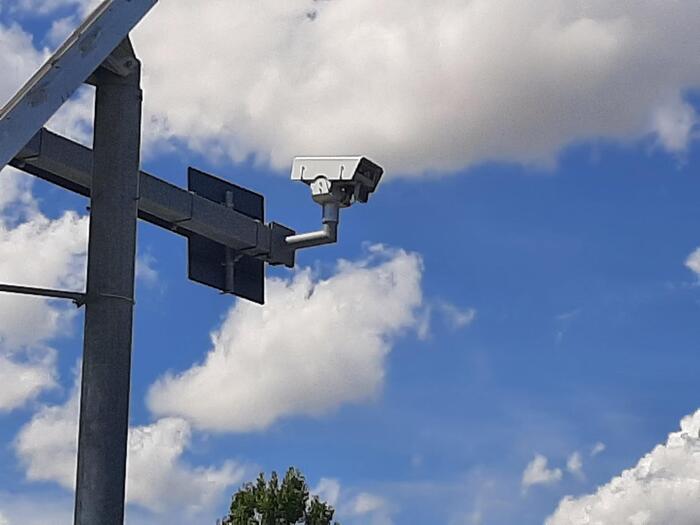Alexander Alfie
10/04/2020 - 19:59
Clarín.com
Politics
In a document that she sent to the Justice without taking any collection for the sensitive information and international impact that it contained, the auditor of the Federal Intelligence Agency (AFI), Cristina Caamaño, generated the largest data leak of Argentine intelligence in democracy .
There are twelve Argentine spies in different countries, with their names and destinations, one of which
works in Lebanon and has been active for 15 years,
inserted in the local community, where Hezbollah, the organization accused of the
attack against the AMIA
, operates
.
In addition,
six secret international agreements
were disseminated
with the United States, Spain, Bolivia and Paraguay,
without consultation with those countries.
There is also the organic structure of the intelligence body, with the name and identification of each of the hierarchical commands in recent years, as well as the names of more than 2,000 spies and former agents, of which 181 are even listed with their number. of DNI.
But one of the most serious issues, as
Clarín was
able to investigate
, are the names of the intelligence delegates in other countries, since they
expose the Argentine agents who are or were undercover in those other countries and their respective families
, as well as foreign agents and officials who trusted Argentine spies.
For example, there are the appointments of an agent, in France;
another in Great Britain;
a man in Russia;
another in Spain;
two in Bolivia;
one in Lebanon;
another in Germany;
a man in Peru;
another in Venezuela and Colombia;
and one more in Paraguay, among other "officials abroad."
Clarín was
able to see the names of those agents, but does not publish them to protect their identity according to the Intelligence Law.
Many are still on the ground.
With the data sent by Caamaño, most of the spies who were sent on missions to other countries can be identified, because the Resolutions contain the names of each of these agents and to which country they were sent by the AFI.
US government search notice for one of the Hezbollah leaders accused of the AMIA attack.
The most serious case is that of MR (Clarín puts only his initials, as a protection measure), who is still in Lebanon.
"This delegation includes the entire hot zone of the Middle East, because the agent has been working there for more than 15 years and has been introduced to the local community under that cover since then," warned an intelligence source.
He added: "Hezbollah, an organization accused of carrying out the attack on the AMIA, operates strongly there."
In the 3,850 Resolutions sent to Justice by Cristina Caamaño,
six secret agreements with other countries are also disseminated, made during the administration of Gustavo Arribas and Silvia Majdalani at the head of the AFI.
In none of these cases were those countries or organizations asked if they agreed to publish them.
Four of these Resolutions are:
the agreement signed between the AFI, the Ministry of Security, the National Directorate of Migration and the United States Terrorist Detention Center
;
the Memorandum of Understanding between the AFI and the National Intelligence Center of Spain;
the Memorandum of Understanding between the National Anti-Drug Secretariat of Paraguay and the AFI;
and the Agreement on Security Matters between the AFI and the Ministry of Government of Bolivia, through the General Command of the Bolivian Police.
"In the AFI led by Caamano, no other intelligence service is going to trust, because we already know that it does not comply with the reserve commitment, the basic budget for joint intelligence work," said an international analyst.
In the midst of this scandal, this week Caamaño would go to the Bicameral Commission for the Oversight of Intelligence Organizations and Activities of Congress, to explain to deputies and senators what his responsibility was in the leak of the AFI's Protocol Book of Resolutions.
The date will be defined this Monday, but they aim for it to be presented this week.
The opposition is pressing and wants me to clarify what happened.
Caamano will point all his darts against prosecutors Incardona and Eyherabide.
But it will be necessary to see how he justifies that he sent 3,850 secret resolutions of the AFI, for a trial in which 22 spies and former agents of the official body are being investigated.
Gustavo Arribas and Silvia Majdalani, former head and number two of the AFI during the government of Mauricio Macri.
Filtering the 3,850 Resolutions
The AFI Resolution Protocol Book has 272 pages, which
Clarín
had access to and advanced on Saturday of last week, with 3,850 Resolutions issued between December 28, 2015 and January 22, 2019, during the administration by Gustavo Arribas and Silvia Majdalani.
The 438 Resolutions issued during the first semester of that administration include 321 names of spies and former AFI agents (including 153 numbers of their DNI), whose identity must be secret, as established by the Penal Code.
The Resolution of August 2, 2016, is the last that includes the name and DNI number of one of its agents in the Book.
Until that day there are 181 spies and former AFI agents who can be easily identified
;
while after that date there are only the names of the agents, together with all the managerial positions and some others with their categories within the official body.
The data that these Resolutions have, in addition to the identity, include the names of the agents whose secrecy was lifted to speak, such as Jaime Stiuso, who appears with their DNI number, and those who testified in the legal case for the death of Nisman;
the creation of bases in the province of Buenos Aires, which were used to carry out illegal espionage during the macrista administration, together with the agents who were part of the groups that spied on 24 political leaders, journalists and union members, which is being investigated in the federal court from Lomas de Zamora.
There is a data that illustrates the level of untidiness that occurred in the sending of all these Resolutions to the Prosecutor's Office of Lomas de Zamora, by the leadership of the AFI.
These are the assignments of agents in different official bodies, such as
PA (by its initials) in the Ministry of Justice and Human Rights, and JC, in the Senate of the Nation
, whose co-workers found out with these leaks who were working during several years with AFI spies.
Something that was also leaked was the authorization for AFI lawyers to send information to intervene in a trial of "former agent
Karina Lamberto", a partner of the current Minister of Security of the province of Santa Fe, Marcelo Sain.
Page 58 of the Book of Protocol of Resolutions of the AFI, with the first measures of the AFI in the macrista management.
The data of most of the agents were crossed out, to prevent their identification, leaving visible those that are already known and are of public interest.
A curious fact is the appointment of
Juan José Gallea,
administrative director of the Directorate of Administration and Finance in the management of Arribas and Majdalani.
Curious journey for those who came from working as
general manager of Sergio Szpolski's ultrakirchnerist media group
, Grupo Veintitrés, and before that he had been the financial director of the SIDE under the management of former president Fernando De la Rúa.
In addition, the name of the former Buenos Aires
commissioner
,
Ricardo Bogoliuk, who was appointed by the AFI in May 2017,
until the end of that year, according to the Resolution Protocol Book,
could be mentioned
.
Judge Alejo Ramos Padilla, in the case investigating the false lawyer Marcelo D'Alessio, also prosecuted Bogoliuk's boss at the AFI,
Pablo Pinamonti, who appears as one of the most responsible for illegal political espionage
in the province of Buenos Aires , whose designation in the AFI appears in the Book with category "D", which is applied to the driving staff of the official body.
The Resolutions include the retirement of former Kirchner spy Fernando Pocino and the retirement of other bosses close to the former head of the AFI, Oscar Parrilli, some of whom have now returned to the current administration, such as
the leader of La Cámpora and director of Counterintelligence, Esteban Orestes Carella,
a confidant of Congressman Rodolfo Tailhade, who resumed as AFI's director of Counterintelligence.
Below him was
Daniel Louys,
whose resignation appears in the Book of Resolutions, and was the spy in
charge of pursuing Stiuso
when Cristina Kirchner broke with the strong ex-man of the SIDE.
Former SIDE agent Antonio "Jaime" Stiuso.
In the Book is the resignation of
Flabio Riquelme, Parrilli's henchman
, who was in charge of the works in his management at the head of the AFI and now he returned with Caamaño, in the government of Alberto Fernández.
The second resolution that was leaked was that of the replacement of Carella by Martín Coste, on December 28, 2015. The former director of Counterintelligence, who was during most of the macrista administration, is one of those prosecuted for illegal espionage at the Patria Institute and to the domicile of Cristina Kirchner, by the federal judge of Lomas de Zamora, Juan Pablo Augé, together with Arribas, Majdalani and Alan Ruiz.
Coste still works at AFI, albeit with another position.
Complaints in Justice
Four former AFI agents denounced the auditor Cristina Caamano for the leak of all these Resolutions.
They accuse her of breach of the duties of a public official and "disclosure of secrecy."
The case was settled in the court of María Romilda Servini de Cubría, with the intervention of the prosecutor Jorge Taiano.
The penalties for these crimes reach up to six years in prison and disqualification from being a public official.
The AFI retirees, who worked in operational and information analysis areas, indicated in their complaint that the National Intelligence Law assigns the “character of secret” to the “identity of the personnel who make up or were part of the ranks of the Secretariat of State Intelligence (SIDE) or its continuation Federal Intelligence Agency (AFI) ”.
Despite this, the official organism's auditor sent the Resolution Protocol Book “without the slightest security guard.
The complainants have belonged to the organization and our identities were exposed ”, they said in their judicial complaint.
The minutes of resolutions 174 to 195, of the year 2016, of the Federal Intelligence Agency.
Names and DNI were crossed out, to prevent the identification of the agents mentioned there.
"We observe that the digitized document with a security code does not have any test (crossed out), a question that is at least striking and that she blames Dr. Caamano for having ordered that this instrument leave the agency in that state," added the former agents.
And they also denounced the head of Realpolitik, Santiago Sautel, for the "disclosure of secret identities", since he published a pdf file with the 272 pages of the Book on that digital news portal, without protecting the names of the AFI spies, for more than 48 hours.
For her part, the auditor
Caamaño herself also made a complaint about the leakage of the Resolution Protocol Book.
At first it was in charge of the judge María Eugenia Capuchetti, with the intervention of the prosecutor Carlos Stornelli, but then it was referred to the Servini de Cubria court, for having the original investigation that the former AFI agents did.
Comptroller Caamaño explained in her complaint that she had sent the Book to the prosecutor's office of the federal court of Lomas de Zamora, where the illegal espionage of political leaders, journalists and union members during the macrista administration is being investigated.
It was a “tax requirement”, by which “a copy of the minute book of the resolutions issued during the period referenced in 135 pages was delivered, placing the corresponding security seal, and attaching the resolution of declassification of the information sent, ”said Caamaño.
Cristina Caamaño, auditor of the AFI.
The AFI intervener stated that in the documentation sent it indicated that "the information is covered by the provisions established" in different regulations in force, "so that it must adopt security measures in this regard so that it certifies that it is available. the information is personal and in the headquarters where it is located,
without allowing the reproduction, duplication or disclosure of documentation or information
, either through technical or human means;
as well as that the information that is not linked to the investigation and arises from the referenced documentation is tested ”.
However, that did not happen and
prosecutors Cecilia Incardona and Santiago Eyherabide uploaded the Minutes Book into the computer system
of Judge Juan Pablo Augé's court, where some 80 lawyers for plaintiffs and defendants in the court case had access, without taking the due protection of personal data of the agents and former agents of the AFI.
For this reason, Caamaño requests that the Justice investigate who violated the current regulations regarding the secrecy of the information contained in the AFI Resolutions.
The national deputies of Together for Change, who make up the Bicameral Commission for the Supervision of Intelligence Bodies and Activities, also filed a complaint with its president, Leopoldo Moreau.
In the letter, the legislators urged Moreau to give legal action to said complaint, taking into account the institutional gravity that the data leak of the organization led by Cristina Caamaño implies.
The prosecutor Cecilia Incardona arrives at the federal court of Lomas Zamora.
Photo Luciano Thieberger.
The deputies Cristian Ritondo, José Cano and Sebastián Garcia De Luca indicated that “the identity of the agents was not protected
, therefore the National Intelligence Law and the Criminal Code regarding the confidentiality of the documentation were violated. data and personnel of the Intelligence organisms ”.
The legislators stressed that, while the AFI and the Lomas de Zamora prosecutor's office, where "the cause of the so-called Espionage M is being substantiated, accusations are distributed, the true origin of the leak is still not clear.
And they warned about "the situation in which the agents whose identity was violated are found and about
the serious risk in which the National Intelligence System is, as well as the relations with foreign agencies whose cooperation is necessary."
In fact, this Sunday another leak was known in the Lomas de Zamora court, since the prosecutors also uploaded the cell phone form of Mauricio Macri's private secretary, Darío Nieto, to the computer system,
with personal and sensitive data of the former president of the Nation, such
as their cell phone numbers, passwords, addresses, credit card numbers and even the Boca Juniors membership card.
But that's part of another story.








